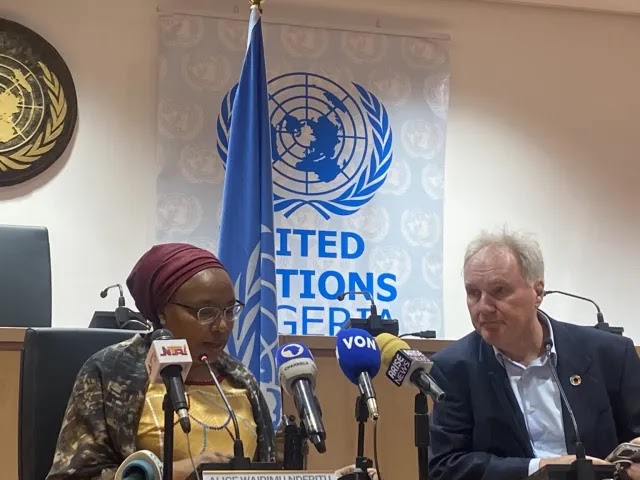As part of preparations for the 2023 general elections, beginning this Saturday, the UN has warned Nigerians to stay away from hate speeches. Ms Alice Nderitu, the UN Under-Secretary-General and Special Adviser of the Secretary-General on the Prevention of Genocide, offered the advice during her visit to Nigeria.
Nderitu emphasises the importance of peaceful and democratic elections, saying that the country’s electoral process had since 1999 proven its commitment to the cause. In her words, “Nigeria has shown its commitment to democratic values, and we must strive to uphold this commitment”.
The UN official further urged Nigerians to eschew hate speeches, as anything contrary could lead to violence, chaos, and other criminal activities. She said that the nation could only progress with peace and unity, so it is essential to ensure that all citizens remain respectful of each other during the election season.
On a positive note, the UN official expressed her confidence in the Nigerian people and their capacity to conduct peaceful elections. She reiterated that the nation can achieve a peaceful and democratic transition of power if the citizens take proactive steps to promote peace and unity.
The UN is doing its part to ensure a peaceful and democratic election season in Nigeria. It is now up to the nation’s’’’ citizens to embrace the UN’s message and do their best to promote peace and unity among their fellow citizens. By uniting together, Nigerians can ensure that the elections successfully transition power and a brighter future for their nation.
“My job is to prevent genocide and related crimes. I am charged with raising the alarm through early warnings to the Secretary-General and Security Council when there is risk and mobilising action to avoid that risk.
“My office also leads the implementation of the UN strategy and plan of action on hate speech, launched by Secretary-General Antonio Guterres in 2019.
“This strategy sets out guidance for UN entities and other societal actors to address hate speech at the national and global levels and enhance efforts at tackling the root causes and drivers of hate speech, including racism and racial discrimination.
“This strategy is in line with international human rights standards and with the right to freedom of opinion and expression,” she said.
She identified the dissemination of hate speech and the absence of independent mechanisms to tackle it as some of the early warning signs and risk factors that could cause genocide.
Other early warning signs she identified include the proliferation of local militias and armed groups, particularly the dehumanisation of violence inflicted on civilians based on ethnicity, religion, race, or nationality.
“No part of the world is immune to the risk of these crimes, and indeed, all societies have risk indicators; how organisations respond to these risks determines if a situation escalates into a more serious concern.
“The election season in Nigeria has witnessed a surge in the use of inflammatory language, hateful and divisive rhetoric; such hate speech is amplified at an unprecedented rate by digital technology.
“Hate speech, especially if accompanied by policies and practices that discriminate against population based on their identity, often results in hate crimes, discrimination, and violence.
“It can be both a precursor and a trigger of atrocity crimes, particularly genocide; countering and addressing hate speech is crucial,” she added.
She said the holocaust and genocide in Rwanda could have resulted from hate speeches.
According to her, the impact of hate speech made those targeted more vulnerable to violence and discrimination.
She added that hate speech specifically impacted women differently and hampered dialogue and reconciliation.
She expressed concern over the proliferation of Diaspora blogs and social media posts that fuel violence.
Nderitu said the UN convened a meeting of traditional leaders from around the world in 2022 in Abuja to develop an action plan to prevent violence and related crimes.
“By addressing divisive and harmful language, we can avoid escalation of tensions that could result in violence, and adopting measures that can help build societies that are resilient and inclusive actions to support victims.
“I emphasise accountability for electoral violence. Lack of responsibility can be detrimental to making and sustaining peace.
“Peace and justice are not contradictory or mutually exclusive categories; accountability constitutes a key component of peace.
“I firmly believe working with governments, larger society – especially women and youths – plays a significant role in preventing crimes at the root by tackling risk factors, promoting sustainable peace and inclusive societies in the long run; prevention remains critical, placing special attention on structural drivers of conflict,” she said.
She urged tech and social media companies to use all tools available to stop the spread of hate speech, which could incite or generate hostility or violence on their platforms.
She praised the media for its role in increasing awareness about the dangers of hate speech and countering narratives of hatred and segregation with facts. (NAN)



